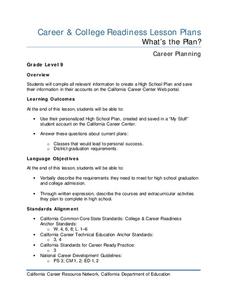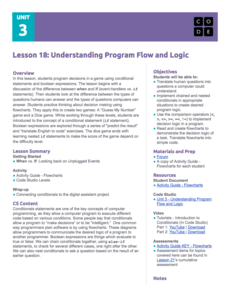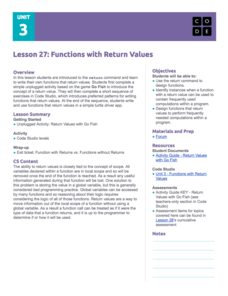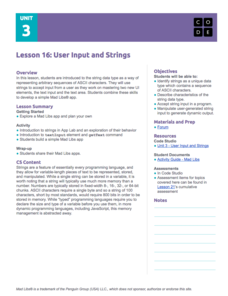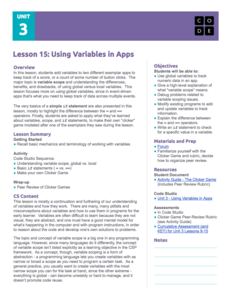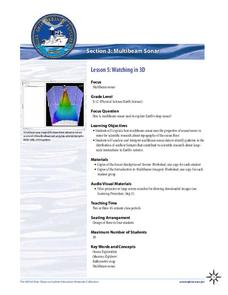Teach Engineering
Connect the Dots: Isometric Drawing and Coded Plans
Individuals discover how to draw cubes on triangle-dot paper. They use cubes to build structures and draw corresponding isometric drawings on dot paper in the second lesson of the series of five. The activity also introduces the concept...
California Department of Education
What’s the Plan?
What classes should pupils take to achieve their college and career goals? Explore the options through a lesson designed with the future in mind. Fifth in a series of six college and career readiness lesson plans, the activity challenges...
Google
Be Internet Awesome
Teach the qualities of a digitally smart citizen with a set of lesson plans created by Google. Along with creating strong passwords, learners explore how to protect their privacy, when to stand up for others against cyberbullying,...
Code.org
Understanding Program Flow and Logic
Explore decision-making logic in programming computer games. The 10th installment of a 21-part unit teaches scholars how to apply conditional statements and Boolean expressions. They use these concepts to create a "Guess My Number" game...
Code.org
Functions with Return Values
Young computer scientists explore how to use the return command in computer programing by playing Go Fish. They learn about functions that return values and then write a turtle driver app using the return function.
Teach Engineering
May the Magnetic Force Be with You
Class members use mathematics in order to better understand magnetic forces and their interaction on charged particles. After a demonstration of the interaction between a magnet and an electron beam using a CRT computer monitor,...
Code.org
Star Wars: Building a Galaxy with Code
Welcome to the code side. The interactive lesson introduces coding in a game format with familiar characters. Young computer experts learn to develop code to control the interaction of the characters in the game. The activity ends with...
Code.org
Encoding Color Images
Color me green. The fourth lesson in a unit of 15 introduces the class to color images and how to encode color images using binary code and hexadecimal numbers — and they will quickly notice that it is easier to code the...
American Library Association
Creating 21st Century Superheroes
Create 21st century learners by utilizing technology and library databases. Scholars explore the concept of comic books as literature and create a superhero who could uniquely solve a 21st century global issue. Databases such as SIRS are...
Code.org
Looping and Simulation
Young computer scientists continue programming with while loops by creating a program to simulate coins flipping.
NPR
Young And Brave Lesson Plan
Honor brave young women with a lesson that showcases 30 individuals who's achievements made a lasting impression on our country's history. Here, scholars randomly choose a person to examine from an interactive myseum exhibit then share...
Code.org
User Input and Strings
Pupils learn to apply strings in computer science. They master two new user interface elements and also use string type data to represent ASCII characters. Finally, individuals create an app for Mad Libs in the eighth lesson of the series.
Code.org
Introduction to Arrays
How can you store lists in a computer program? The 16th installment of a 21-part unit introduces arrays as a way to store lists within a variable. Individuals program a list of their favorite things—adding interest to the activity.
NPR
Progressive Era Lesson Plan
The women working for equal rights in the early 20th century weren't a part of one large group; rather, they were members of dozens of small groups focused on social reform. Explore the ways groups in the Progressive Era like National...
Code.org
Using Variables in Apps
Investigate the benefits of using global variables. The seventh installment of a 21-part unit continues the study of variables from the previous lesson. Young computer scientists modify two existing apps by adding variables and learn how...
NOAA
Watching in 3D
Bring the ocean floor to life! Earth science scholars discover the process of deep sea mapping in the third installment in a series of five lessons about ocean exploration. The teacher's guide includes helpful resources, worksheets, and...
National Research Center for Career and Technical Education
Photoshop Scale
Say cheese! Can your class take a great photo and size it to fit any need? A career and technology-centered lesson plan demonstrates the correct way to resize images in Adobe Photoshop. Scholars view a presentation and work individually...
SurfScore
Kodable
Prepare young scholars for life in the twenty-first century with this introduction to computer coding formatted as a fun problem solving game, this resource is a great way to develop children's sequential thinking...
National Research Center for Career and Technical Education
Break-Even Point
How do companies determine the prices of their products? Marketing maestros discover the concepts of cost and break-even point through discussion, independent practice, and a collaborative assessment. The career and technology-oriented...
Teach Engineering
Storing Android Accelerometer Data: App Design
There's an app for that! Pupils learn to build an app that will store data on an Android. The instructional activity introduces class members to the tiny database, TinyDB, for Android devices. A video tutorial provides an...
California Department of Education
An Online Tool I Can Use
Tools for school—and beyond! Introduce your sixth graders to online tools to plan their academic and professional futures. The fifth and final lesson plan in a series of career and college readiness activities focuses on a scavenger hunt...
Code.org
Image Scroller with Key Events
Discover how to embed images in lists. Scholars modify an existing app to include an image scroller in the 17th lesson of the series. They learn to refactor code and remove redundancies after modifying code.
Laura Candler
Bio Poems Made Easy
A creative way bring autobiographical writing to your poetry unit or back-to-school curriculum, this lesson plan guides you through a bio poem activity. Kids use the graphic organizer to describe themselves using adjectives, things...
California Department of Education
What Matters to Me?
Whether you're a self-starting entrepreneur or a cubicle commando, finding a career that suits your personality is a must! The second lesson in a series of five career and college lesson plans focuses on work ethic and values. Learners...

